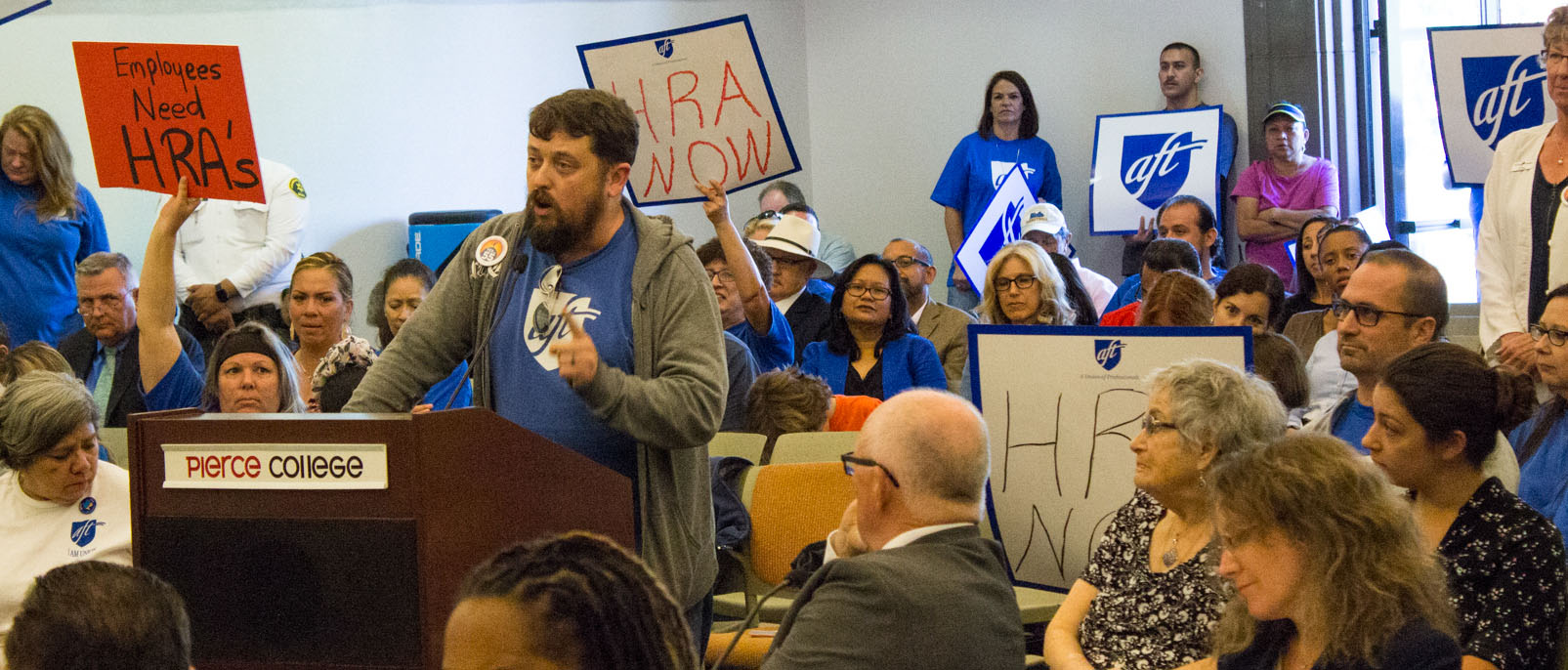
Faculty and staff district wide find themselves in a battle with the Board of Trustees over benefits set to end January 2017.
The union made an arrangement with the Board of Trustees to save the district money back in 2008, according to American Federation of Teachers Chapter President Fernando Oleas. In exchange for switching insurance providers to CalPERS and moving from 90/10 to an 80/20 pay scale, the union received a Health Reimbursement Agreement in the amount of $1,500 per year for each member. With this HRA they could pay for any expense that was not covered by insurance.
History instructor and AFT chapter grievance officer Brian Walsh remembers when the agreement was first made.
“When we saw the cliff ahead of us, as a union we really fell on our sword,” Walsh said. “We did this on the basis that this was a temporary accommodation. We did this so people wouldn’t get laid off, so too many classes wouldn’t get cut. We were thinking about education. Not just our jobs, but our students.”
According to Oleas, the HRA was set to end due to the Affordable Healthcare Act, the district would begin incurring an additional tax from the HRA, known as the Cadillac tax.
According to the Wall Street Journal, the Cadillac tax is a 40 percent tax on high-cost health plans provided by employers. The tax plan was at the center of the Affordable Healthcare Act.
The Cadillac tax is now not set to come into effect on the account until 2020. Because of this change, Oleas says the union members deserve the HRA extended.
“We put up a proposal on their table on May 11, 2016,” Oleas said. “Usually when you reopen they have to respond. The team has to come to the table, look at the proposal we have, and come back with a decision. They didn’t. That in itself is disrespectful to the faculty, and faculty can not properly plan.”
The board did see the proposal but, according to Los Angeles Community College District Vice Chancellor Human Resources Albert Roman, they did not send a response to it for months.
“The board had limited discussions,” said Roman. “Part of the challenge was our inability to be able to get time in closed sessions to be able to discuss the proposal and be able to respond to it. However there was an acknowledgement verbally to the union that we had received their proposal.”
The tensions came to a head at the Board of Trustees meeting on Oct. 5 at Pierce College. Union members filled the Great Hall in a show of solidarity, taking the opportunity to address the board members and share their personal stories.
“There is a human element right here,” Oleas said. “And I guess because of political expedience, the president of the board has not listened to anybody and has decided to not even acknowledge the proposal we have put on the table.”
Walsh shares Oleas’ sentiments regarding the board’s concerns for their own political careers.
“If our stories didn’t move this Board of Trustees than I think we’re going to have a problem,” Walsh said. “Trustees come and go, and a lot of them see this as a way to get to another job. These people are political jobbers, and they’re going to move from job to job. This is about keeping the pressure on them. Making sure they remember us and that they can’t sacrifice us for their political career.”
Oleas sees this issue as an underlying problem with how the campuses are run throughout the district.
“We do have an issue with the Board of Trustees, especially with the president of the board, Scott Svonkin,” Oleas said. “He’s been disrespectful, he doesn’t listen, and he makes a lot of decisions for the schools. We’re tired of the unilateral decisions that have been made. The way that they’re centralizing the operations and the Board of Trustees is attempting to manage every single college.”
According to Oleas, each campus is supposed to have a level of autonomy to be able to make decisions for themselves.
“This autonomy has been drained and I think this is because of the Board of Trustees desires to control certain areas and to put out their façade of so-called responsibility,” Oleas said. “In the meantime the campuses are suffering. We don’t have a good working conditions. Our campuses are dirty, our bathrooms are filthy. We don’t have a proper IT department. We don’t have the technology in place so we are neglecting our ability for teachers to teach and students to learn well.”
Political arguments aside, Director of Health Center Beth Benne sees the value of the HRA.
“As a healthcare provider I am very aware of the cost of healthcare, I have to provide healthcare here to our students,” Benne said. “I know how much it costs, how the costs have gone up over the years. We have a very generous benefits program, I can’t complain about the benefits. But benefits don’t cover everything and the HRA card is really an important part of all of our budgeting.”
According to Roman the board is willing to discuss the HRA extending into 2017, however they would like to reexamine other aspects of the contract as well.
“The district has responded to the labor group and has said that they’re interested in looking at the HRA,” Roman said. “But we want to make sure we look at the other elements of the benefits package and their compensation together.”



